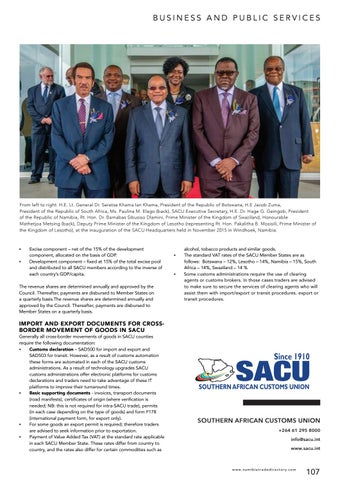BUSINESS AND PUBLIC SERVICES
From left to right: H.E. Lt. General Dr. Seretse Khama Ian Khama, President of the Republic of Botswana, H.E Jacob Zuma, President of the Republic of South Africa, Ms. Paulina M. Elago (back), SACU Executive Secretary, H.E. Dr. Hage G. Geingob, President of the Republic of Namibia, Rt. Hon. Dr. Barnabas Sibusiso Dlamini, Prime Minister of the Kingdom of Swaziland, Honourable Mathetjoa Metsing (back), Deputy Prime Minister of the Kingdom of Lesotho (representing Rt. Hon. Pakalitha B. Mosisili, Prime Minister of the Kingdom of Lesotho), at the inauguration of the SACU Headquarters held in November 2015 in Windhoek, Namibia.
• •
Excise component – net of the 15% of the development component, allocated on the basis of GDP. Development component – fixed at 15% of the total excise pool and distributed to all SACU members according to the inverse of each country’s GDP/capita.
The revenue shares are determined annually and approved by the Council. Thereafter, payments are disbursed to Member States on a quarterly basis.The revenue shares are determined annually and approved by the Council. Thereafter, payments are disbursed to Member States on a quarterly basis.
•
•
alcohol, tobacco products and similar goods. The standard VAT rates of the SACU Member States are as follows: Botswana – 12%, Lesotho – 14%, Namibia – 15%, South Africa – 14%, Swaziland – 14 % Some customs administrations require the use of clearing agents or customs brokers. In those cases traders are advised to make sure to secure the services of clearing agents who will assist them with import/export or transit procedures. export or transit procedures.
IMPORT AND EXPORT DOCUMENTS FOR CROSSBORDER MOVEMENT OF GOODS IN SACU
Generally all cross-border movements of goods in SACU counties require the following documentation: • Customs declaration – SAD500 for import and export and SAD503 for transit. However, as a result of customs automation these forms are automated in each of the SACU customs administrations. As a result of technology upgrades SACU customs administrations offer electronic platforms for customs declarations and traders need to take advantage of these IT platforms to improve their turnaround times. • Basic supporting documents - invoices, transport documents (road manifests), certificates of origin (where verification is needed; NB: this is not required for intra-SACU trade), permits (in each case depending on the type of goods) and form F178 (international payment form, for export only). • For some goods an export permit is required; therefore traders are advised to seek information prior to exportation. • Payment of Value Added Tax (VAT) at the standard rate applicable in each SACU Member State. These rates differ from country to country, and the rates also differ for certain commodities such as
SOUTHERN AFRICAN CUSTOMS UNION +264 61 295 8000 info@sacu.int www.sacu.int
w w w. n a m i b i a t r a d e d i r e c t o r y. c o m
107
